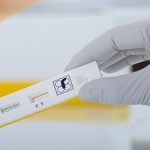May is completely characterized by intestinal health: first Digestive Disease Week, now World IBD Day. The aim of the IBD action day is to raise awareness about inflammatory bowel diseases (IBDs). The many prejudices that patients face show how important this initiative is.
May 19 is World IBD Day. To raise awareness about chronic inflammatory bowel diseases, famous monuments will be lit in purple on this day in many cities across the world. There are various informational events and actions that are being organized by the European Federation of Crohn’s and Ulcerative Colitis Associations (EFCCA) and by patient organizations in individual countries. Spreading awareness is important: More than five million people worldwide suffer from Crohn’s disease or ulcerative colitis—still, the general population knows very little about the diseases. This lack of knowledge is also seen in the comments that affected people keep hearing. We will get to the bottom of some of these misconceptions here:
1. Inflammatory bowel disease (IBD) and irritable bowel syndrome are the same
Distinguishing patients with IBD from patients who suffer from irritable bowel syndrome (IBS) is usually very difficult as these two conditions share similar symptoms. The two groups present similar unspecified symptoms like abdominal pain and diarrhea. The cause is different, however: IBD patients have intestinal inflammation, which IBS patients do not have. The different causes require different treatment also. A stool test that measures calprotectin helps in differentiating the diseases.
2. IBD affects only the intestines
Even through intestinal inflammation is the primary characteristic of the disease, patients can also have symptoms outside of the digestive tract. These extraintestinal manifestations include inflammation of the skin, eyes, and joints.
3. IBD is due to stress
Many people still hold the view that stress is the cause of IBD. According to our current understanding, stress is not a trigger of the disease—but it can aggravate symptoms.
4. Diet can make the symptoms disappear
Inflammatory bowel diseases are based on an immune response that has become imbalanced. By releasing TNF-α, the body is continuously sending the signal to promote inflammation. Certain medications (TNF-α blockers) can interrupt this signal and stop the inflammation. Avoiding certain foods alone will not do this, which is also why there is not a recommended diet for IBD patients.
5. IBD can be healed
If you are diagnosed with IBD, you will have it your entire life. Even though phases with complaints alternate with phases without complaints, patients have to take life-long medication. Since the effect of the medications can decrease over time, experts recommend monitoring the effect regularly through therapeutic drug monitoring (TDM).









